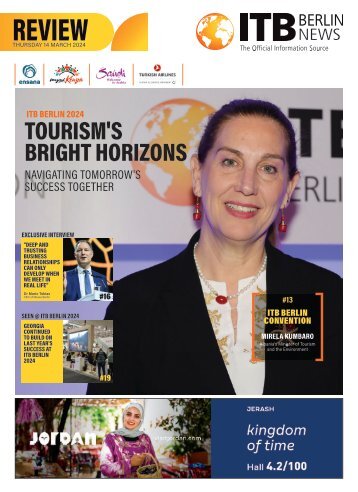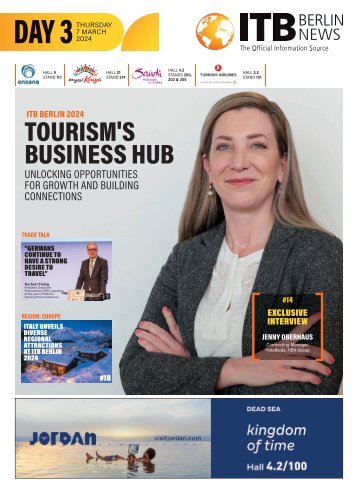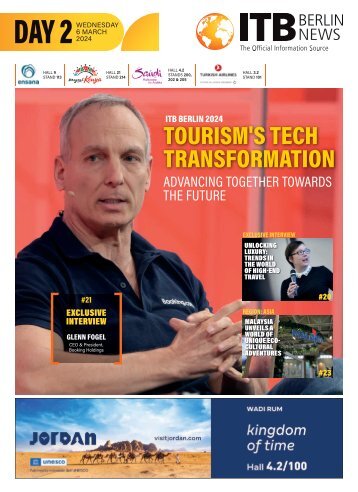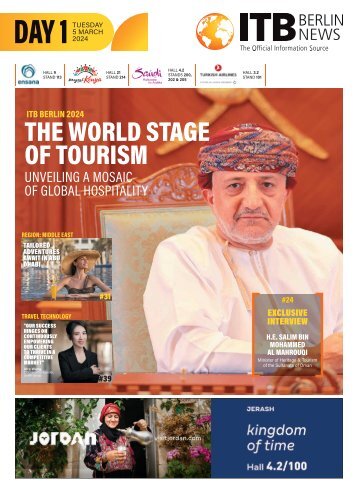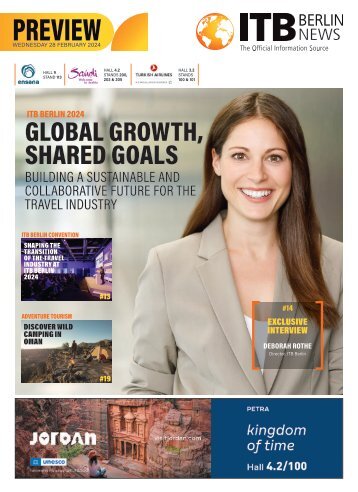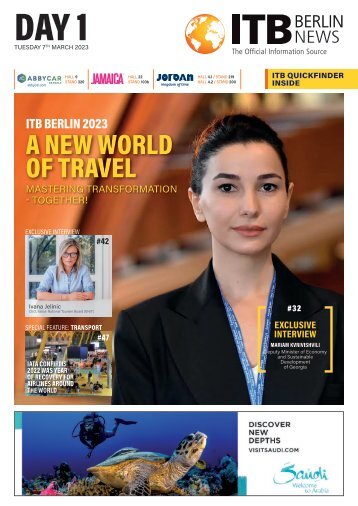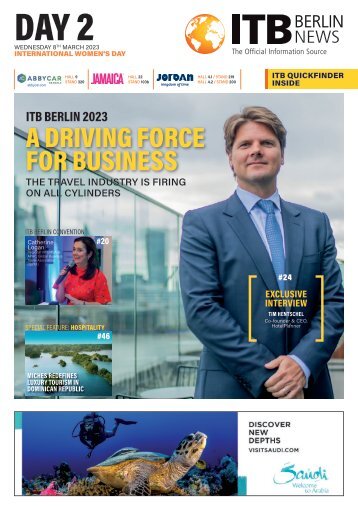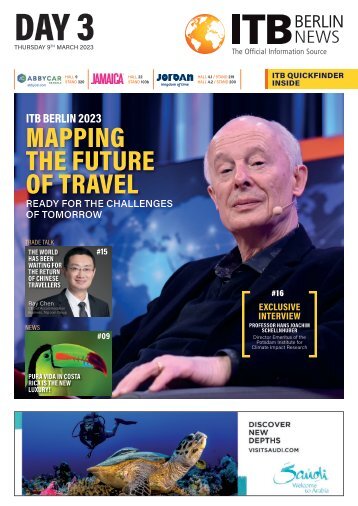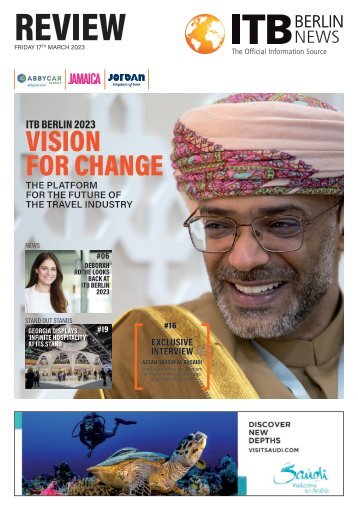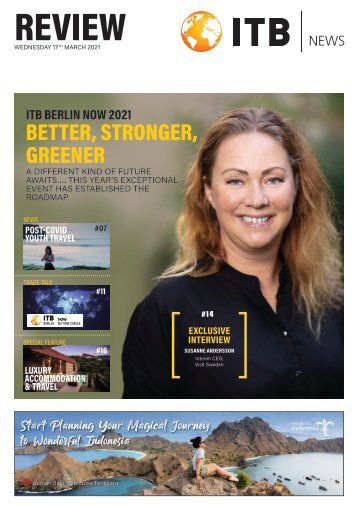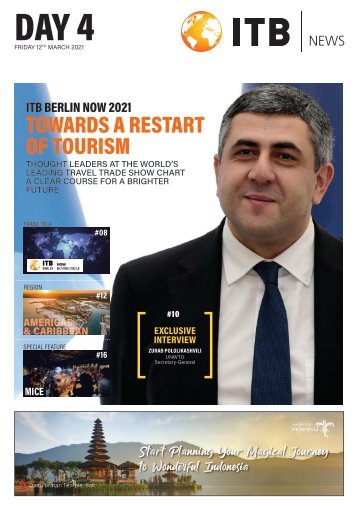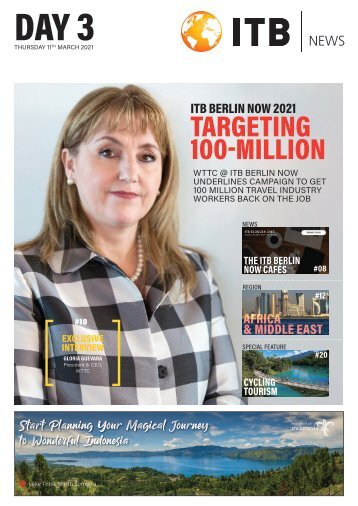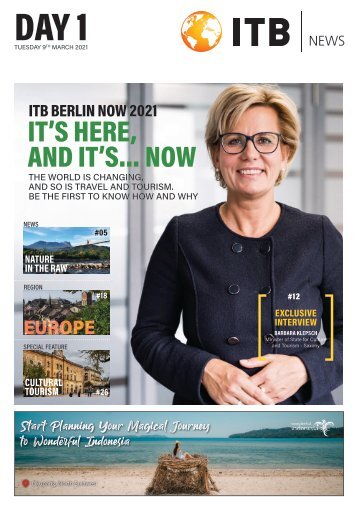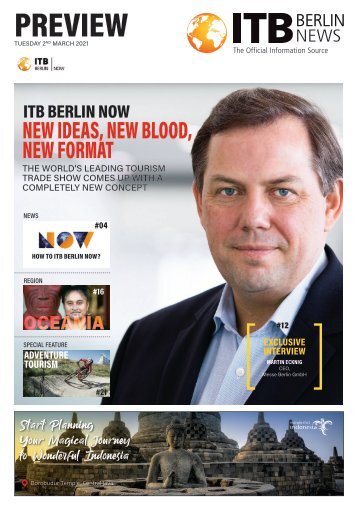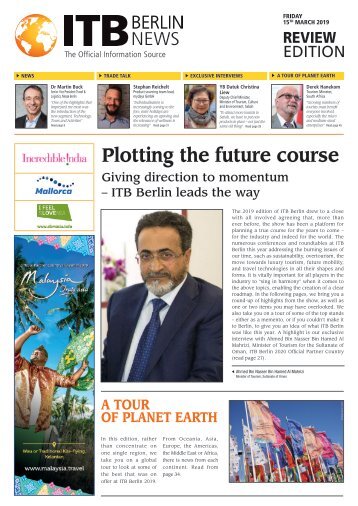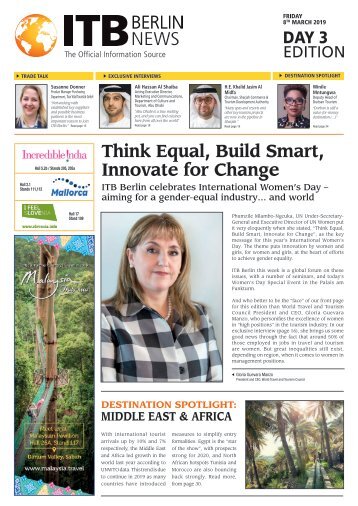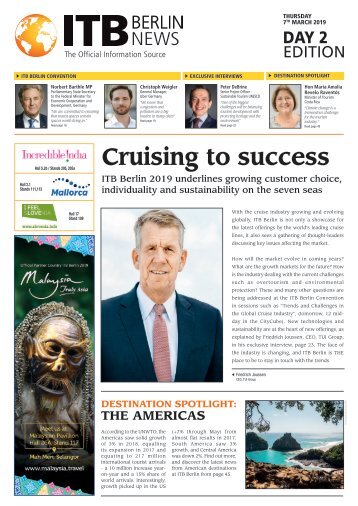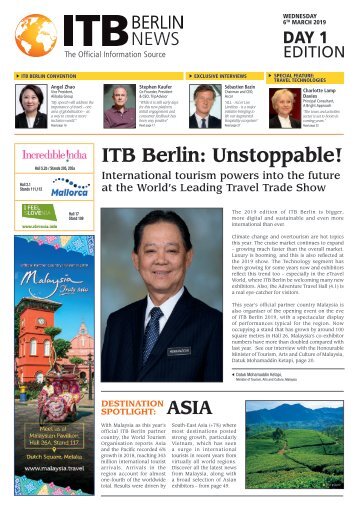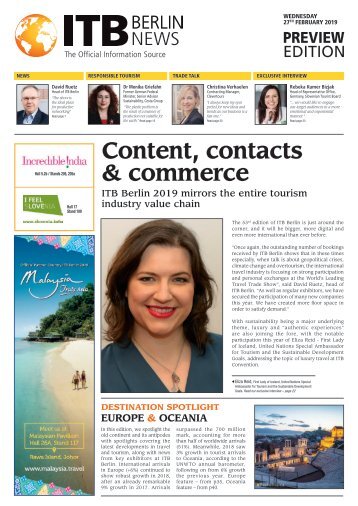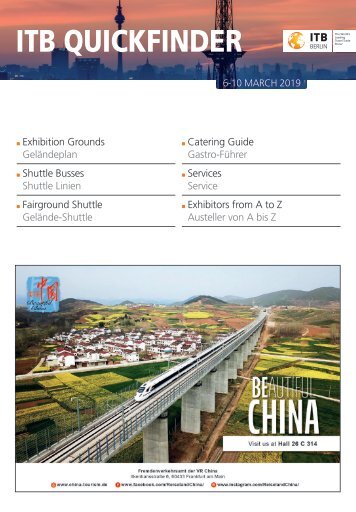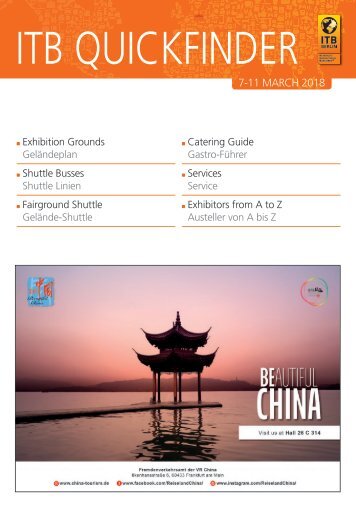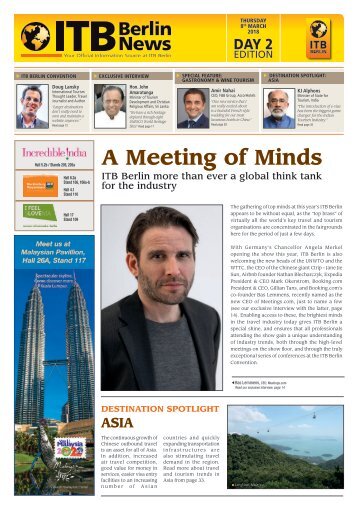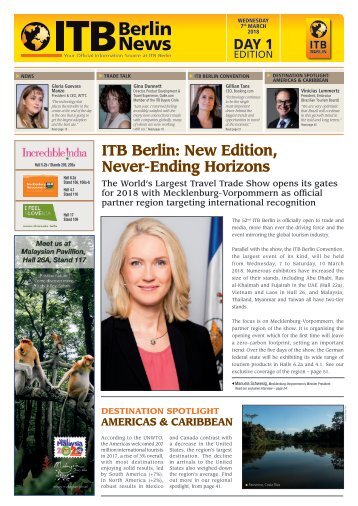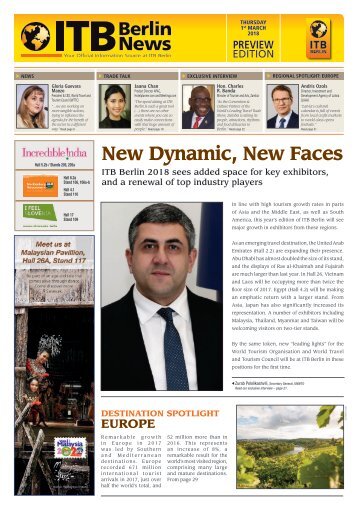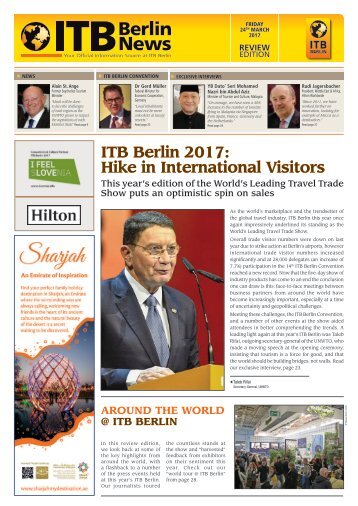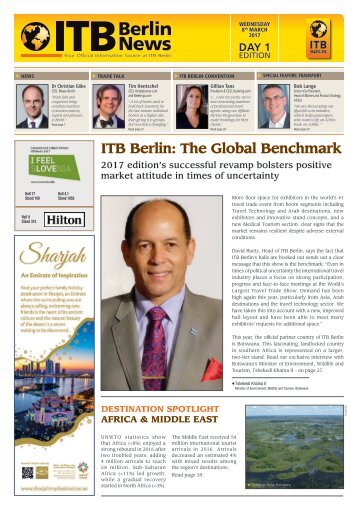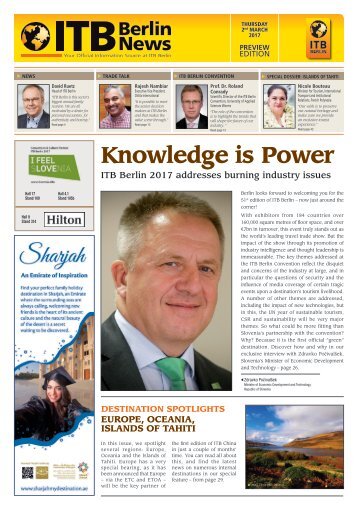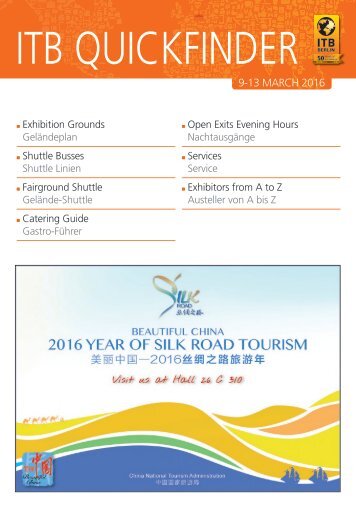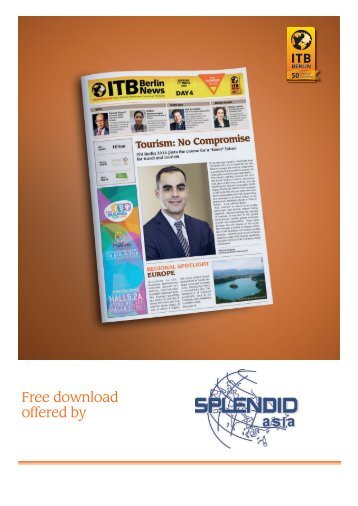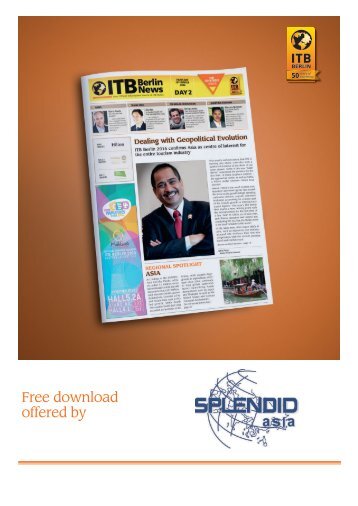
2023 ITB Berlin - DAY 2 Edition
- Text
- Tourism
- Hotels
- Tours
- Resort
- Berlin
- Resorts
- Exhibitors
- Tourismus
- Halle
- Safaris
- Wwwcleverdiscom
I ITB
I ITB BERLIN CONVENTION I #IWD2023 Catherine Logan Regional VP EMEA & APAC, Global Business Travel Association (GBTA) Expectations for intuitive, easy-to-use apps should drive B2B innovations Catherine Logan, Regional VP EMEA and APAC, Global Business Travel Association (GBTA), speaks about the new trends shaping business travel ahead of today's ITB Berlin Convention conference "Business Travel Is Back. So Where Do We Go From Here?" How has the business travel segment performed in 2022? In 2021, business travel recovery proceeded at a more cautionary pace than originally expected. However, GBTA data forecast a surge in 2022 to reach 3 billion or 64% of prepandemic business travel spending. Europe was predicted to be the fastest growing region with global business travel spending forecast to increase by 61.7%. Meanwhile we expect that business travel spend will get close to pre-pandemic levels in 2025, reaching .39 trillion What are the key priorities for business travel going forward? The way we work transforms the workplace and influences business travel's future. Bringing together teams for collaboration and retention of the corporate culture are a priority in a hybrid working environment. Meeting face-to-face remain strong but increasingly focus on sustainability with a change in mindset towards meaningful travels. Economic uncertainty and the ongoing war in Ukraine are some of the factors that will keep the industry focused on costs and budgeting. How are business traveller's attitudes and expectations changing? Working from anywhere, digital nomadship, and bleisure are all on the rise. Business travellers look consequently for technology solutions to help communication and collaboration in this environment. Expectations for intuitive, easy-to-use apps should drive B2B innovations. They also increasingly express a desire for greener travel through information to help sustainable choices based on price, time and CO2 emissions. Technology will be key for both business travel suppliers and corporates, ensuring business travellers have the most up-to-date information at their fingertips to make informed choices. Why is it important for the GBTA and other business travel sectors to meet at ITB Berlin? It is important that the business travel sector comes together to discuss, collaborate, and find solutions for the challenges facing our industry. ITB is the perfect stage to such discussions. As an association we are delighted to be at ITB presenting on some of the key topics facing the industry DON'T MISS BUSINESS TRAVEL IS BACK. SO WHERE DO WE GO FROM HERE Today, 8 March 2023 > 10:40 - 11:10 am Location: Hall 3.1 / Green stage 20 ITB BERLIN NEWS • WEDNESDAY 8 TH MARCH 2023 www.itb-berlin-news.com
#IWD2023 I ITB BERLIN CONVENTION I Experimentation, innovation and agility are key ingredients for future Prof. Dr. Clemens Fuest, President of the ifo Institute – Leibniz Institute for Economic Research at the University of Munich, was speaking at the ITB Berlin Convention Future Track Prof. Dr. Fuest discusses the impact of the economy on the tourism industry and how companies in the sector can react in an exclusive interview with ITB Berlin News. What are the main challenges facing the travel and tourism industry in 2023? Inflation and rising interest rates are most likely to limit the available travel budgets. At the same time demand for travel will be high after the years of restrictions due to the Covid pandemic. The challenge will be to accommodate those needs. How can companies prepare/ navigate challenges which are out of their control? By adjusting their way of operating and the products they offer. For instance, a possible reaction to tight budgets could be to offer the right mixture of short and exciting or longer and well-priced trips. What opportunities does this present and how can companies capitalise on them? The opportunity is to adjust more quickly and accurately to this new economic environment and to the needs of the market. How important are digital technologies for the future of the travel industry and why? Digital technologies have changed many aspects of the travel industry and will continue to do so. One of the key issues is that digitisation allows steady improvements in the matching between what companies offer and what consumers want. How important are international events like ITB Berlin for mastering these changes? Events like ITB are key for building new networks and for generating new ideas for improvements of business models and services. Prof. Dr. Clemens Fuest gave a detailed presentation during his conference titled "The global economy and the great transformation: Outlook and implications for the tourism industry." He traced the economic impact of the current situation on society in general as well specifically on the tourism industry. Prof. Dr. Fuest looked at how Europe has been dealing with society’s transformation since the COVID pandemic, the implications of the current crisis and what the tourism industry can do to react and anticipate a society that has become less stable overall. He emphasised the importance of agility and stated that companies should embrace experimentation and innovation. According to Prof. Dr. Fuest, rather than looking forward to the return of a stable society and making things “like before,” it is important to “build back better.” Another theme of the conference was that the tourism and hospitality industry, due to its very nature, could be considered an indicator of trust on a global scale. It is thus very important for companies to put customers’ minds at ease. Prof. Dr. Fuest addressed questions of sustainability and greenwashing, expressing frustration at the bureaucratic hoops companies sometimes have to jump through but highlighting the progress that has been made in the use of renewable energy in Europe as well as the overall increased awareness of climate issues: “we all want to live more sustainably” © ifo Institute - Romy Vinogradova THE IMPORTANCE OF TAILORING TOURISM OFFERS TO CUSTOMERS Prof. Dr. Clemens Fuest noted the importance of adapting tourism and travel offers to today’s changing market. One major trend he mentioned was baby boomers as a group. These travellers have money saved and increasing time for tourism. They are older and looking for more comfortable offers. This is a group travel companies can target specifically with adapted packages and marketing. Prof. Dr. Fuest underlined a certain polarisation of the market as on one hand are these baby boomer travellers, and on the other end of the spectrum, there are populations with less money to spend on travelling due to inflation, such as families. Prof. Dr. Fuest suggested that travel companies should offer a range of options adapted to different budgets including shorter stays or more basic accommodation. This year travellers in general are willing to spend more on their trips post-pandemic since they have had their travel plans blocked for so long, but Prof. Dr. Fuest suggested that this trend would only last a year or two and that travel companies should be ready for smaller budgets by providing suitable packages for them ITB BERLIN NEWS • WEDNESDAY 8 TH MARCH 2023 21
- Page 1: DAY 2 WEDNESDAY 8 TH MARCH 2023 INT
- Page 9: #IWD2023 I NEWS I Georgia delivers
- Page 12 and 13: I NEWS I #IWD2023 ADVERTORIAL Disco
- Page 14 and 15: I NEWS I #IWD2023 ADVERTORIAL © Er
- Page 17: #IWD2023 I NEWS I WTTC announces ne
- Page 22 and 23: I TRADE TALK I #IWD2023 Simone Zagr
- Page 24 and 25: I EXCLUSIVE INTERVIEW I #IWD2023 ©
- Page 26 and 27: I EXCLUSIVE INTERVIEW I #IWD2023 Ha
- Page 28 and 29: I EXCLUSIVE INTERVIEW I #IWD2023 Jo
- Page 30 and 31: I EXCLUSIVE INTERVIEW I #IWD2023 Ja
- Page 33 and 34: #IWD2023 I REGION I ASIA I Asia Pac
- Page 35 and 36: #IWD2023 I REGION I ASIA I Thailand
- Page 37 and 38: #IWD2023 I REGION I ASIA I ADVERTOR
- Page 39 and 40: #IWD2023 I REGION I ASIA I PULAU HU
- Page 41: #IWD2023 I REGION I ASIA I ADVERTOR
- Page 44 and 45: I GERMAN REGION I BAVARIA I #IWD202
- Page 46 and 47: I SPECIAL FEATURE I HOSPITALITY I #
- Page 48 and 49: I SPECIAL FEATURE I LUXURY TRAVEL I
- Page 50 and 51: I SPECIAL FEATURE I CULTURAL TOURIS
- Page 52 and 53: I SPECIAL FEATURE I CRUISES I #IWD2
- Page 54: © Emilio Del Prado #IWD2023 WHERE
- Page 58 and 59: EXHIBITION GROUNDS GELÄNDEPLAN hub
- Page 60 and 61: SHUTTLE BUSSES & FAIRGROUND SHUTTLE
- Page 62 and 63: SERVICES SERVICE Airport / Hotline
- Page 64 and 65: EXHIBITORS FROM A TO Z / AUSTELLER
- Page 66 and 67: EXHIBITORS FROM A TO Z / AUSTELLER
- Page 68 and 69: EXHIBITORS FROM A TO Z / AUSTELLER
- Page 70 and 71:
EXHIBITORS FROM A TO Z / AUSTELLER
- Page 72 and 73:
EXHIBITORS FROM A TO Z / AUSTELLER
- Page 74 and 75:
EXHIBITORS FROM A TO Z / AUSTELLER
- Page 76 and 77:
EXHIBITORS FROM A TO Z / AUSTELLER
- Page 78 and 79:
EXHIBITORS FROM A TO Z / AUSTELLER
Inappropriate
Loading...
Mail this publication
Loading...
Embed
Loading...
